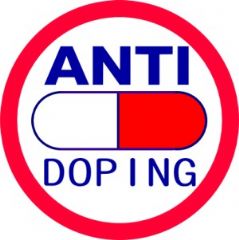Blood doping
(Redirected from Blood boosting)
Blood Doping: Enhancing Athletic Performance[edit | edit source]
Blood doping is an illicit practice in the realm of sports and athletics aimed at enhancing an athlete's performance by artificially increasing the number of red blood cells in their circulation. This article provides an in-depth exploration of blood doping, its methods, risks, and the ethical and legal implications associated with this controversial practice.
Understanding Blood Doping[edit | edit source]
Blood doping involves the manipulation of an athlete's blood to improve their oxygen-carrying capacity. This can lead to increased endurance, stamina, and overall athletic performance. The practice is primarily used in endurance sports such as cycling and long-distance running.
Types of Blood Doping[edit | edit source]
Blood doping can be categorized into two primary methods:
\
Autologous Blood Doping[edit | edit source]
In autologous blood doping, an athlete stores their own blood, usually extracted well in advance of competition, and reinfuses it before an event. This increases the athlete's red blood cell count, enhancing oxygen delivery to muscles.
Homologous Blood Doping[edit | edit source]
Homologous blood doping involves the use of blood from a compatible donor. The athlete receives a transfusion of donor blood to achieve the same result—a higher red blood cell count.
Risks and Health Concerns[edit | edit source]
Blood doping carries significant risks and potential health concerns:
Infection[edit | edit source]
Transfusions can introduce infections into the athlete's bloodstream if proper precautions are not taken.
Blood Clots[edit | edit source]
Increased blood viscosity resulting from higher red blood cell counts can lead to the formation of blood clots, which can be life-threatening.
Detection and Consequences[edit | edit source]
Many sports organizations and anti-doping agencies have stringent measures to detect blood doping. Athletes caught engaging in blood doping can face severe penalties, including disqualification and bans from competitions.
Ethical and Legal Implications[edit | edit source]
Blood doping is widely considered unethical and is banned by most sports governing bodies. The practice is seen as cheating and undermines the principles of fair play in sports.
Anti-Doping Agencies[edit | edit source]
Several international anti-doping agencies, such as the World Anti-Doping Agency (WADA), work diligently to prevent, detect, and penalize blood doping in sports.
Notable Cases[edit | edit source]
Blood doping has been a contentious issue in the world of sports, with several high-profile cases making headlines. Notable athletes have faced consequences for their involvement in blood doping.
Legal Status[edit | edit source]
The legal status of blood doping varies by country and sports organization. While it is universally banned in many sports, the penalties for violations can differ.
Conclusion[edit | edit source]
Blood doping remains a controversial and unethical practice in the world of sports and athletics. While it may offer short-term performance benefits, the risks to an athlete's health and the potential for detection and consequences far outweigh any potential gains. It is essential for athletes to prioritize fair play, ethical competition, and the long-term well-being of their bodies.
For further information on related topics, please explore our articles on Doping in Sports, Anti-Doping Measures, and Sports Ethics.
| This article is a medical stub. You can help WikiMD by expanding it! | |
|---|---|
Search WikiMD
Ad.Tired of being Overweight? Try W8MD's physician weight loss program.
Semaglutide (Ozempic / Wegovy and Tirzepatide (Mounjaro / Zepbound) available.
Advertise on WikiMD
|
WikiMD's Wellness Encyclopedia |
| Let Food Be Thy Medicine Medicine Thy Food - Hippocrates |
Translate this page: - East Asian
中文,
日本,
한국어,
South Asian
हिन्दी,
தமிழ்,
తెలుగు,
Urdu,
ಕನ್ನಡ,
Southeast Asian
Indonesian,
Vietnamese,
Thai,
မြန်မာဘာသာ,
বাংলা
European
español,
Deutsch,
français,
Greek,
português do Brasil,
polski,
română,
русский,
Nederlands,
norsk,
svenska,
suomi,
Italian
Middle Eastern & African
عربى,
Turkish,
Persian,
Hebrew,
Afrikaans,
isiZulu,
Kiswahili,
Other
Bulgarian,
Hungarian,
Czech,
Swedish,
മലയാളം,
मराठी,
ਪੰਜਾਬੀ,
ગુજરાતી,
Portuguese,
Ukrainian
Medical Disclaimer: WikiMD is not a substitute for professional medical advice. The information on WikiMD is provided as an information resource only, may be incorrect, outdated or misleading, and is not to be used or relied on for any diagnostic or treatment purposes. Please consult your health care provider before making any healthcare decisions or for guidance about a specific medical condition. WikiMD expressly disclaims responsibility, and shall have no liability, for any damages, loss, injury, or liability whatsoever suffered as a result of your reliance on the information contained in this site. By visiting this site you agree to the foregoing terms and conditions, which may from time to time be changed or supplemented by WikiMD. If you do not agree to the foregoing terms and conditions, you should not enter or use this site. See full disclaimer.
Credits:Most images are courtesy of Wikimedia commons, and templates, categories Wikipedia, licensed under CC BY SA or similar.
Contributors: Kondreddy Naveen


